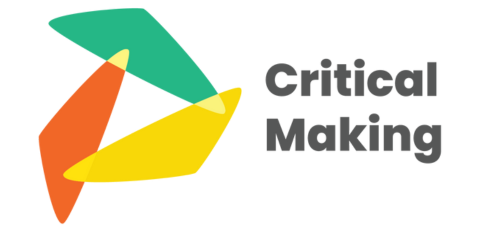|
|
|
|
|
|
|
|
|
A Journey of Discovery and Impact
|
|
|
We’re thrilled to announce the successful conclusion of the Critical Making Project, and we thank each one of you for joining us on this remarkable and meaningful journey!
Over the course of two and half years, we embarked on a series of initiatives culminating in a wide range of interactive tools and literature tailored for academia, practitioners, and educators alike.
|
|
|
|
|
|
|
2
|
A Self-Reflection Tool with guiding questions to promote social and ecological responsibility of maker projects
|
|
3
|
A Tool Kit designed to facilitate participatory and reflexive maker practices
|
|
|
|
|
In addition, the project resulted in the publication of eight academic papers that delved into Critical Making and responsible innovation processes within grassroots innovation. The project’s activities garnered meaningful participation from over 4,000 individuals and engaged more than 200 institutions worldwide.
To mark the conclusion of the Critical Making project, we're taking steps to share its outcomes and results widely so as to reach as many practitioners as possible. Our journey has highlighted the power of collaboration in magnifying impact, and we invite you to help spread the word through your online networks.
|
|
We have also curated a Social Media Kit with ready-to-use text suggestions, and eye-catching images and videos here.
|
|
|
Some Project Highlights in Pictures 🌟
|
|
|
|

|
Feedback and Testing Workshop for Open Hardware Mentoring Programme re:publica 2022
|
|
|
|
|
|

|
|
Inclusive Maker Lab and Camp
|
|
The MISSION X project of HONF and the XXLab in Indonesia, an inclusive maker lab & camp
|
|
|
|
|
|

|
|
Session on Critical Making in Education at Network meeting of mobile FabLabs
|
|
|
|
|

|
|
Hands on Flashlight Making Workshop at re:publica 2023
|
|
|
|
|
|
|
|
What's Next for Critical Making? 🚀
|
We will continue to find a home on Wikifactory, enjoying perpetual free hosting for open-source projects and tapping into a thriving community of over 150,000 global designers, engineers, and innovators. Our partnership with Wikifactory harnesses its global infrastructure and network to sustain the advancement of Critical Making research and tools.
Through an ongoing refinement of the project’s outcomes, we will continue to enrich the growing knowledge base on the social innovation potential of maker movements. Insights from the project will serve as a compass for further research and policy counsel. We will also extend the project’s results to initiatives such as mAkE, fostering knowledge dissemination across networks like the African Makerspace Network and the Fab City Foundation.
|
Additionally, the project’s research outcomes will aid VTT’s continued exploration of the openness of making as a social innovation, driving fresh research ventures and network establishment. The Critical Making Guidelines for Inclusive Making will be added to VTT's host of resources that address gender inclusion in research and innovation too.
|
Last but not least, we will continue to facilitate engagement with global maker communities by encouraging members in GIG's network to adapt the Flashlight box for local educational purposes and facilitate Critical Making workshops that are aligned with local contexts in diverse communities.
|
|
If any of the above initiatives peak your interest and you are keen to collaborate, please feel free to reach out to us at [email protected]!
|
|
|
|

|
|
|
|
These activities are part of the Critical Making Project and have received funds from the European Union’s Horizon 2020 research and innovation programme under grant agreement No. 101006285
|
|
|
|
|
|
|
|